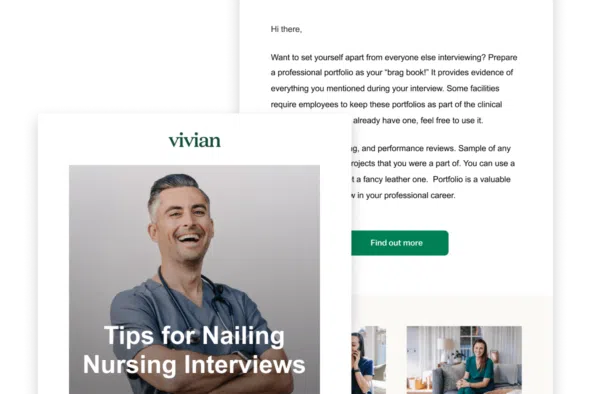Travel nurses are temporary workers under contract used to supplement staffing in healthcare facilities across the country. Most travel nursing jobs are full-time and contracts traditionally last 13 weeks, but some are shorter or longer. Hospitals, long-term care facilities, home health systems, clinics and many other sites hire travelers to help them cover their scheduling gaps. Use this comprehensive Q&A guide to find answers to the most frequently asked questions about travel nursing.
What is traveling nurse work?
Travel nursing consists of experienced nurses traveling to hospitals, clinics and other healthcare facilities across the country, filling in at various understaffed settings to provide patients with quality care. Travel nursing emerged in the 1970s in response to many facilities having a higher patient load than their current staff could handle. However, early work arrangements were informal, with travelers being hired on as staff for however long they were needed, then the nurses left when the need ended. Now, travel nurses sign contracts for a set amount of time to fill these temporary positions.
How do I start travel nursing?
Getting started is easier than you might think. Check out Vivian’s Travel Nurse Careers: Is Travel Nursing Right for You for some pros and cons of travel nursing. Once you have the required clinical experience, you’ll find tons of places where you can find travel nursing jobs. However, Vivian Health is your one-stop-shop for travel nursing jobs because you can browse 1,000s of jobs from 100s of travel staffing agencies with a single profile. Click “I’m Interested” on any job post to start chatting with a recruiter from the agency that posted the job.
How do I write a winning travel nursing resume?
Building a winning resume for your next travel or staff nursing application should get the hiring manager’s attention. You only have about 5 to 10 seconds to do it. Start with an attention-grabbing summary outlining your years of experience, most recent work setting and some strong action verbs about your experience for the position you’re seeking. Always tailor your summary to match the job you’re applying for so it highlights relevant experience. Then, list your work history going back 7 years, with the facility name, location, your job title, dates of employment and 3 to 6 bullet points detailing the hard and soft skills you used in this position that relate to the job you want.
How far in advance should I start the application process to be a travel nurse?
Traditionally, seasoned travel nurses start looking 2 to 6 weeks before they want to start their next travel assignment. If you know you’re ready to travel or will be soon, we recommend filling out an application so you’re prepared to seize the right opportunity.
What is a travel nurse recruiter?
Travel nurse recruiters work for travel nursing agencies and act as your personal contact before and during your contract. They submit you to the hospital, health system or other healthcare facilities for approval and arrange interviews before starting. If you have any questions about a contract, ask your recruiter, they’re there to help you. During your assignment, travel nurse recruiters usually check in with you to ensure everything is going okay and provide assistance if you have issues at the facility. They’re also responsible for letting you know if the hospital wants to extend your contract and for contacting the hospital on your behalf if you would like to stay longer.
What do I ask a travel nurse recruiter?
There are so many questions to ask your recruiter throughout the whole process of finding and signing a contract. The most important questions about a job are pay, hours required, shift and duration of the contract. However, you should also ask a recruiter about the benefits associated with the agency and any clauses that exist in case of contract cancellation.
Can I negotiate pay with my travel nurse recruiter?
Yes, you can negotiate your travel nurse pay with your recruiter. Depending on the contract, there may be room to advocate for yourself. Nurses can use Vivian’s salary tool to browse rates in their specialty and selected location and compare contracts across different agencies to learn whether a rate is fair. Our salary transparency allows you to use this information as leverage in your negotiations.
Can I be a travel nurse as a new grad?
Unfortunately, no. Most facilities require at least one year of experience, and most prefer two, especially for a high-acuity specialty. As a travel nurse, you’re expected to hit the ground running, sometimes after only 4 to 8 hours of orientation on the unit. Most new grads don’t have the experience necessary to be successful in a travel nurse assignment. Their lack of experience could also impact patient care and jeopardize their patients’ lives.
Can I travel nurse with 1 year of experience?
Yes, travel nursing generally requires at least one year of paid clinical experience as a nurse, though requirements may vary with different healthcare facilities. Some facilities or travel assignments may require more than one year of experience, especially for high-acuity nursing specialties.
What type of experience do I need to be a travel nurse?
Depending on the healthcare facility, you must have at least one year of recent experience in the specialty you’re applying for, preferably in a hospital/acute care setting. Recent generally means within the last 6 to 12 months. However, most facilities prefer two or more years of experience.
Do I have to be a nurse to travel?
Nurses aren’t the only healthcare professionals who can travel. Vivian Health supports all types of traveling healthcare workers. Allied health professionals such as respiratory therapists, ultrasound techs, CT/MRI techs, medical techs, rad techs, perfusionists, PTs and OTs, SLPs and many more can find travel positions on Vivian’s jobs marketplace.
Why should I become a travel nurse?
Becoming a travel nurse includes many perks. Great pay, the freedom to choose when you work and when you don’t, exploring cool new locations, gaining new professional experiences and expanding your professional and personal network are just a few reasons why you should become a travel nurse.
What is bad about travel nursing?
While travel nursing is the right career choice for some, the many cons of travel nursing make it unappealing to others. Despite the many perks, you must consider the bad aspects to ensure you’re prepared for the realities of travel nursing. These include multiple licensure requirements, the numerous logistics of constantly traveling from one assignment to the next and varying pay rates that make budgeting challenging. Other cons include always being the new nurse on the block, being in unfamiliar environments at work and off work, getting stuck with the worst shifts and being scheduled to work holidays and weekends. Plus, loneliness, housing concerns, tax considerations and family constraints may impact your decision to do travel nursing.
What states can I travel to as a travel nurse?
You can travel nurse in any U.S. state in which you hold a license. You can also apply for a license in other states or travel to other Nurse Licensure Compact states if you hold a multistate/Compact license. Some states have fast licensing, while others take months. Explore nurse licensure requirements by state on Vivian and read our guide to Preparing Your License for Travel Nursing Jobs for more details.
Where do most travel nurses go?
While there isn’t a set place that’s most popular among travel nurses, California has historically attracted many travel nurses due to the excellent patient ratio laws and the gorgeous year-round weather in most parts of The Golden State. California also boasts some of the highest-paying travel nurse jobs, but a high cost of living often balances that out. Thus, smart travel nurses look at the compensation and compare it to the cost of living to make the most fiscally responsible decision.
Do travel nurses fly?
Whether travel nurses fly depends on the situation. If time is a consideration, flying may be the best option since it’s quicker than driving. Travel nurses might also fly if they don’t enjoy road trips or traveling long distances alone makes them nervous due to safety concerns or the possibility of breaking down in the middle of nowhere. However, some travel nurses prefer to drive, so they have their own car for use on days off and enjoy taking the scenic route to their destinations to make memories along the way. They may also prefer driving so they can bring more of their belongings, or they’re traveling with family and don’t want to pay for the additional plane tickets or with pets who can’t fly. In the end, the decision is yours.
How long are travel nursing contracts?
Typically, assignments last 13 weeks. However, shorter and longer assignments may be available. Shorter-term assignments often exist in areas experiencing crisis situations. Crises contracts may last 4, 6 or 8 weeks, but these can also vary. Strike contracts are typically the shortest, sometimes lasting only one or two weeks. When a contract expires, a healthcare facility may ask you to extend if they still need help. Travel nurses can also initiate a contract extension if they want to continue working at the same facility and know there’s still a need for nurses.
Is travel nursing a career?
Absolutely! Many travel nurses travel for years before returning to a permanent staff position, and some just keep traveling their entire careers. You gain so much experience as a traveler, and it’s a great way to see the country. Despite the common misconception that travel nursing requires you to take a step back from your career development and advancement opportunities, there are plenty of ways travel nursing can help you develop your nursing career rather than putting it on hold.
Is travel nursing stressful?
Travel nursing can be stressful because you must have a great deal of flexibility and adaptability. Facilities expect travel nurses to perform all the duties of their staff nurses, often with little orientation or training. Travel nurses must be comfortable working in extremely fast-paced, potentially chaotic environments. Always being in new work environments and locations away from friends and family can also increase stress levels.
Can you cancel a travel nurse contract?
Canceling a travel nurse contract depends on your contract. However, you should avoid cancellations unless there’s a personal emergency or if you genuinely feel your license is in danger. Some contracts have no penalty if you give two weeks’ notice, but others require complete fulfillment, or you may have to pay a hefty fee or be ineligible for rehire by the agency and healthcare system. If you’re struggling with your assignment, reach out to your manager and recruiter to discuss options. Try your absolute best not to cancel a contract with little to no notice.
Why are travel nurses needed?
All nurses can relate to the short-staffing issues that plague the industry. All specialties and types of facilities suffer from this problem. Travel nurses help fill these staffing holes while managers recruit and train permanent staff. Travel nurses are also used to cover maternity leaves or help out during an electronic health record conversion. Additionally, many hospitals and healthcare systems rely on local agency staff, another form of travel nursing, to help complete their schedules.
Where are travel nurses needed?
Travel nurses are literally needed everywhere. Places with higher needs often pay a bit more. Less popular rural areas may also have higher rates. California is always hiring, pays great and offers safe staffing ratio laws that protect all nurses working in the state, but the cost of living can cut into your salary. Other states among the highest paying staff locations also often have a high demand for travel nurses. Choose your top five locations and determine how much money you need to make, then check out the travel nursing jobs waiting for you to apply.
How does a travel nurse get paid?
Travel nurses who claim a permanent tax home have a blended rate. This rate includes tax-free stipends and a taxable hourly wage. While the taxable hourly wage often seems low, the stipends make the pay much higher. Travel nurses who can’t claim a permanent tax home can still take travel contracts and have a rate similar to a blended rate, but all their wages will be fully taxed.
How often do travel nurses get paid?
Travel nurses are usually paid weekly by their travel staff agencies.
How much do travel nurses make?
According to Vivian Health’s salary data, how much travel nurses earn varies greatly, but the average weekly rate of travel nurses in May 2023 was $2,240 per week. While this weekly average has dropped since the high wages seen during the pandemic, it’s still higher than pre-pandemic rates. Plus, this is an average of all travel nursing roles. Some travel jobs pay much more and nurses who can take the tax-free stipends pay less in income taxes, pocketing more of their pay. Factors like facility, agency, specialty and local demand for nurses can greatly impact travel nurses’ pay rates.
What is the highest-paying specialty for travel nursing?
The highest-paying RN specialties for travel nurses often mirror those of staff nurses, but they can vary by location. In May 2023, the top five travel RN jobs posted on Vivian with the highest weekly rates included labor and delivery, first assist, operating room, telemetry and pediatric nurses. You can also find high-pay travel nursing jobs by factoring in location, experience, shifts, overtime, cost of living and various other elements.
What travel nurses are most in-demand?
While certain travel nurse specialties pay more, other specialties may actually have a higher demand due to more job openings. In May 2023, the top five specialties listed among travel RN jobs on Vivian Health included med surg, telemetry, PCU, emergency department and ICU nursing roles, making travel nurses in these specialties in high in-demand.
What is the highest-paid travel allied health job?
The highest-paid allied health travel job can fluctuate as demand increases and wanes. However, comparing travel allied health jobs posted on Vivian in May 2023, physicists had the highest pay at $8,259 per week. The remaining top five highest-paying allied health roles during this period included perfusionists at $5,110 and jobs for CT, ultrasound and mammography technologists that all paid $5,000 weekly.
What is a bill rate?
Bill rates are the total amount the agency charges a healthcare facility per nurse supplied. The agency splits the bill rate into nurse pay packages, agency fees and costs associated with orientation, licensing fees, benefits, bonuses and anything else required to successfully put a nurse through travel nursing assignments.
Do travel nurses make more than staff nurses?
Most travel nurses make more money than they would as staff nurses, with or without tax-free stipends earned by duplicating expenses to establish a permanent tax home. However, this always depends on the cost of benefits and pay for specific travel nurse assignments.
How much do travel nurse recruiters make?
According to Glassdoor, the national average for travel nurse recruiters was $91,972 annually on September 15, 2022, when the latest data was available. This annual salary included base pay of $68,819 and $23,153 in additional pay, such as commission, bonuses and profit sharing. However, a recruiter’s years of experience and the agency that employs them impact their salary. Learn more about how recruiters and agencies make their money in our Understanding Bill Rates guide.
What are travel nurse stipends?
Stipend is another word for reimbursement, except agencies pay stipends up front each week in the travel nurses’ paychecks. In the travel staffing industry, agencies generally use the term to describe tax-free pay for housing and meals and incidentals. In a travel pay package with a blended rate, a portion of your salary is taxable and the other portion is the tax-free stipends. To qualify for stipends, travelers must be able to claim a permanent tax home, duplicate their expenses between their permanent home and wherever their assignment takes them, and make their own housing arrangements. However, an agency can only pay so much in stipends, according to the GSA rates for per diem work. The government determines this number, and staffing agencies can’t exceed the maximum recommended amount without raising red flags.
Are travel nurse stipends taxable?
No, travel nurses who qualify for stipends don’t pay income taxes on these stipends. However, you must be able to claim a permanent tax home and duplicate expenses to qualify. There’s a lot of information to understand about travel nurse taxes, and tax rules change frequently.
How do travel nurses file taxes?
You may need a professional tax preparer to file your travel nurse taxes even if you filed your own taxes prior to becoming a travel nurse. You must file in all the states you’ve worked in throughout the year. While this is the same process as filing in your home state, a tax pro can keep you from being double-taxed by your home state and the state(s) of temporary employment. Your stipends are already deducted, so there’s no need to itemize expenses that fall under the housing or per diem categories. However, you should save receipts for these things in case you’re ever audited.
What do travel nurses do for health insurance?
Most agencies provide some form of health insurance for the travel nurses who contract with them. While few agencies offer free health insurance, many have reasonable costs for a single person. Other options include state marketplaces or 3rd party insurance merchants. Travel nursing health insurance can be a drawback of this career path, but always ask your recruiter about your health insurance options both during and between your travel contracts.
Can travel nurses deduct mileage?
Travel nurses can’t deduct mileage if they receive tax-free stipends for housing and per diem expenses. However, if you’re taking a fully taxed wage and traveling to your place of work, you may be able to deduct mileage depending on the current tax rules. Talk to a tax professional to see what you can and can’t deduct before considering a travel nursing career.
Can I travel and work PRN?
Yes, you can travel and work PRN if it doesn’t conflict with your contract schedule or decrease your performance.
Can travel nurses work part-time?
Most travel nurse contracts are full-time, meaning 36 to 40 hours per week. If you want to work part-time, local agency per diem contracts may be a better route. It doesn’t have to be “local” to your permanent tax home. Many large cities and healthcare systems have managed service providers that staff a huge local float pool for hospitals to utilize. Because facilities use travel nurses to fill desperate staffing needs, part-time employment doesn’t usually make sense for the facility.
Can travel nurses work overtime?
Whether travel nurses can work overtime depends on the facility and the contract. While some travel nurses never have a problem working OT, some facilities won’t allow travelers to work OT because they claim it’s too much of an expense. However, OT rates vary significantly between agencies and hospitals, so make sure it’s worth it before taking extra shifts. Some agencies only pay overtime based on your hourly taxed rate, which will be low if you take tax-free stipends. You can negotiate for a higher OT rate or take per diem jobs on the side.
Can travel nurses work close to home?
Although the IRS doesn’t state the exact distance you must work from your home, most facilities require that you work at least 50 miles from your permanent tax home. However, this can vary. Some facilities have even longer distance requirements, such as at least 180 miles away, so check with your recruiter. You can still work as a traveler if your home is within the mileage radius. But you won’t be eligible for tax-free stipends, so your wages will be fully taxed, which cuts into your net pay.
Do travel nursing contracts include housing?
All agencies have differences regarding housing in their travel nursing contracts. Some agencies provide housing, while others add the housing stipend into your pay, allowing you to choose and pay for your own accommodation. If you take agency-provided housing, be aware that your paycheck will be much less than the agency initially quoted. The initial pay package quotes are gross income that includes stipends and hourly wages. Most agencies only pay you an hourly wage and per diem stipends if you opt to find travel nurse housing yourself.
How do travel nurses find housing?
Many agencies offer to provide housing, but this could mean your stipends take a huge hit and your take-home pay suffers. Finding your own travel nurse housing is generally more economical, even if it requires more legwork. There are tons of resources and websites for finding travel nurse housing to help you.
Can travel nurses bring pets?
Absolutely! Many nurses travel with pets. If you’re taking agency-provided housing, you must check in advance if they allow pets and if there are any breed restrictions. If you’re finding your own housing, simply look for apartments and rooms that allow pets. It’s becoming more common for people to allow pets as they realize many nurses want to travel with their fur babies! Most places require a pet deposit (which may or may not be refundable) as well as a cleaning fee. There are also pet-sitting or pet-walking services, like Rover, that travelers utilize when in cities away from their homes.
Can travel nurses bring their families with them?
Yes, many nurses travel with their families, including partners and children. It helps to have a partner who can work remotely or takes seasonal jobs in various locations. When children turn school-aged, it can be tough to bring them along. Consider taking longer contracts in the same school district, homeschooling your children or only traveling during the summer months when school isn’t in session.
Can a travel nurse stay as permanent staff after completing a contract?
You can stay as permanent staff after completing a contract as long as you don’t have a limiting agreement with your agency. Some agencies still have clauses stating you can’t take a permanent staff job in the area within a certain number of weeks or months after completing an assignment. Many nurses choose to sign on as staff after a contract because they loved the people and the location. Once you sign on as a staff nurse, you no longer receive stipends and must change your permanent tax residence.
How does Vivian work?
Vivian isn’t a travel nurse staffing agency but a marketplace for healthcare professionals to browse jobs with pay transparency. Click “Browse Jobs” to view available positions on our site. You can add filters found on the top of the page for specialty, location and job type, or browse through the featured cities, top-rated health systems, quickest recruiters, top-paying agencies or highest-paying travel locations using the tabs below. If you’re interested in a job, click “I’m Interested,” which generates a chat with the recruiter/agency assigned to the post. They should be able to answer any questions about the job and start the application process if you’re ready.
What is the Vivian Universal Profile?
The Vivian Universal Profile allows you to view 1,000s of jobs from 100s of agencies with transparent pay rates posted using a single job application. Usually, when you’re looking for travel nurse jobs, you must fill out applications with all the different agencies that you’re interested in seeing their job postings. If you decide to apply well in advance of when you’d like to travel, Vivian keeps your information on file and stays in touch until you’re ready to apply.
Does Vivian offer working VISA assistance?
Vivian doesn’t offer working VISA assistance at this time. Because Vivian is a jobs marketplace and not an agency, we’re never the employer. Thus, we aren’t in a position to assist with working VISAs.
Can travel nurses file for unemployment?
Yes, but you must meet the unemployment requirements in your permanent tax home state to file. Additionally, the unemployment provider calculates your unemployment amount based on your taxable hourly wage. Your taxable hourly rate is likely relatively low if you receive tax-free stipends. Be prepared for lower-than-expected benefits.
Can travel nurses have tattoos?
Most facilities still have a clause in their dress code policy that states you can’t have any visible piercings or tattoos. However, you’ll likely see both staff and travel nurses with clearly visible tattoos and piercings. Most facilities seem to tolerate them if they aren’t offensive and if the piercings are subtle, like a single nose ring. But it ultimately comes down to unit culture and policy as to whether tattoos or piercings are acceptable.
Can travel nurses work internationally?
The short answer is yes; travel nurses can absolutely work internationally. However, Vivian only posts jobs in the United States at this time. Also, you must pass a fluency exam to claim you’re fluent in another language. If you aren’t fluent in another language, your options are limited to English-speaking countries. The United Kingdom, New Zealand and Australia are popular with international travel nurses. Only certain travel nursing agencies have the capabilities to help place you in an assignment like this. The contracts tend to be a year or more and require a lot of paperwork and patience.
Do travel nurses need U.S. experience?
Yes, most travel job employers only hire nurses with recent U.S.-based clinical experience. However, some Canadian-trained nurses could find travel jobs within the U.S. if they were practicing in a similarly structured environment. Canadian nurses must meet minimum requirements to work in the United States, including graduation from an accredited nursing program, RN licensure in Canada and two years of nursing experience before passing the NCLEX-RN and completing other necessary steps for licensure in the U.S.
Browse travel nursing jobs on Vivian after setting your specialty and preferred location to find the perfect match for your next adventure.
Disclaimer: This article contains general advice. Policies and benefits vary from employer to employer. Please consult an accountant or other tax professional if you have specific questions about your taxes.
















I am a Cardiac Cath Lab experienced nurse, when I started my first travel assignment, the unit I am assigned is Cath Lab, Interventional Radiology, including Code Stroke which I have zero experience. I tried to do a 2 weeks orientation with IR procedures but I am still not comfortable working in this new role as RN. Any advice?
Hello and thanks for reaching out! Working outside your nursing ability can lead to very serious consequences for your patients and yourself. Patient safety should always be the top consideration. Also, if anything happens to a patient under your care, it’s your responsibility and your license at risk. We suggest talking to your recruiter right away to discuss the situation and your concerns about patient safety to learn what resources the agency might have available to assist you.
I have my associate degree currently working with 1.5 yr experience… What are my chances of getting hired?
Hello Antonio and thanks for reaching out! Most travel nursing jobs require 1 to 2 years of clinical experience, so you should be able to find a position that works for you. Please visit Vivian’s travel nursing job board, found here https://www.vivian.com/nursing/travel/ to see if we have any jobs that interest you. You can fill out a profile, apply for the jobs that sound like a good fit and take the next step in your travel nursing journey. We’d love to help you find a travel assignment that works for you! If you have any questions about our website, please feel free to use the “Contact Vivian” option under the Resources tab to reach our 24/7 help desk for further assistance.
Is it possible for a nurse with a warning on her license to be a travel nurse?
Most likely not Ann as it may require you to become licensed it other states and each state has different rules for the BON
You can apply for positions via nursefly using the “browse jobs” feature! You can search by any of the factors listed in the sidebar, including location, pay rate, and specialty. If you need anything feel free to reach out, I’m with SkyBridge Healthcare and we have COVID-19 crisis rates right now for multiple specialties.